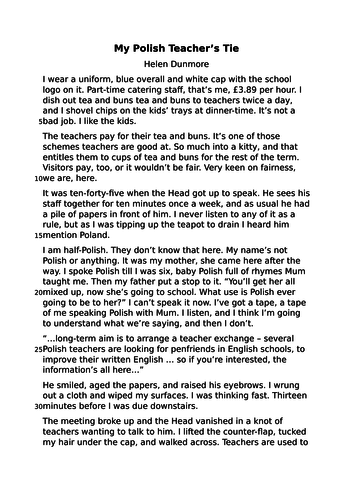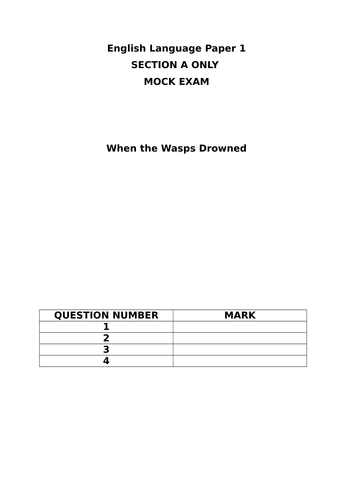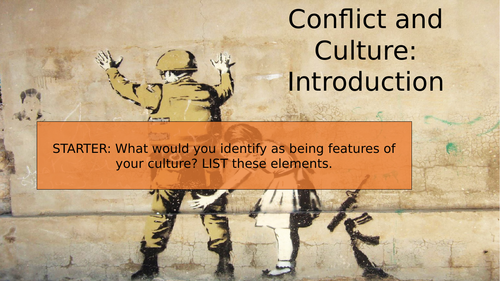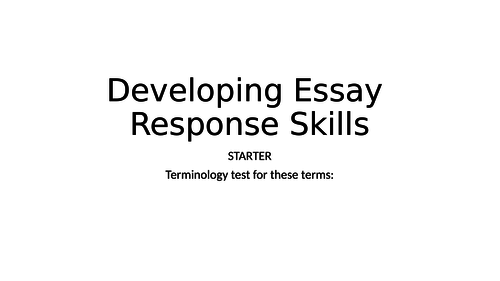
228Uploads
561k+Views
1394k+Downloads
All resources

KS3: Born a Crime - Structure Focus
A lesson take from a collaborative scheme of work. The lesson focuses on the quite excellent Born A Crime by Trevor Noah. The focus is developing an initial understanding of South Africa, then Trevor Noah himself, before focusing in on the context surrounding the story itself.
After, the focus switches to analysing the structural choices made in the extract.
Additionally, I’ve included a useful little follow up lesson where the focus ins to build a piece of creative writing that follows a specific structural path.

KS3: As You Like It - GCSE Focused SoW
To make effective use of this scheme I suggest you have a copy of the most recent RSC version of As You Like It (It is quite marvelous…) else a lot of the images I use will make little sense.
There are five “lessons” that each last around the two hour mark. Each of the assessments is available, so the whole package is a self-contained unit of work. We had a lot of fun with this unit, and I inter-spaced the learning with periods where the class would act out elements of the play.
You don’t necessarily need a copy of the play to teach this unit either.

Universal True or False Spreadsheet/Worksheet Generator
An easy to use spreadsheet where you build a bank of true or false statements (tab 3) which will then create a randomly generated worksheet of ten true or false statements (tab 1). Additionally, an answer sheet will be generated too (tab 2) allowing for the resource to be used in a whole class setting.
All you need to do is populate the spreadsheet with true/false statements and then identify which statements are true, and which are false.
Instructions are built into the spreadsheet itself.

Head of Year/College Central Spreadsheet
I designed this spreadsheet to track a bunch of the elements I needed to keep an eye on within the Head of Year role. Remember, hide the columns you don’t need and write comments to keep a fuller track of details. A watered-down version of each area is available to see on the top sheet. Also, you can add/modify the menus The areas are as follows:
CONTACT TRACKER: Designed to keep track of meetings and phone calls from class room teacher all the way up to governors.
TARGET TRACKER: Similar to contact tracker but it allows for you to track a set of targets. I’d log the target in a comment and then enter a new target should I need to do so.
OUTSIDE AGENCIES TRACKER: The original reason I set the spreadsheet up. Allows for you to see who has interactions with an agency (e.g. Early Help) and track your contact with them.
BULLYING/INCIDENT TRACKER: Accounts for identification of incident, investigation and follow up. You can then log the action.
TOILET/TIME OUT PASS TRACKER: Allows for you to monitor when a pass was set up and keep a check of how frequent it is used.
You’ll need to copy some of the sections to expand. Not a spreadsheet for the faint hearted, but you’ll only ever need THIS spreadsheet.
EDIT: Hello. I’ve included an updated version of this spreadsheet. I’ve used it over the year and, whilst I have found it to be REALLY useful, there were some issues with ordering things and the information becoming corrupt. So, I’ve made a new one that uses the students admission numbers as a starting point. The spreadsheet offers the same features as the one above, but with the following additions:
YEAR TRACKER: Tells you clearly how many FSM, PP, Early Help, CIN and many other categories of students you have in one go.
PASTORAL TRACKER: Allows you to track form issues, social issues and a variety of other elements. My intention is to make the spreadsheet available to my Year Team so they can check in on the status of their form members.
More importantly, you can re-order things and it won’t screw up the data.
The spreadsheet is designed to import information from Bromcom on the initial entry page, but it’s easy enough to fill in using other starting points.

AQA Power and Conflict Poetry True or False Statement Generator
A useful little resource that can be a starter/plenary element in your lessons. The spreadsheet generates ten randomly selected true or false statements from a bank of over 260. Each of the power and conflict poems is covered and there is the scope for you to add in your own or edit the statements that are there.
I released this to my year 11s as a revision tool and they found it very useful.
Additionally, I have included a blank copy of the spreadsheet so you can create your own ToF statement generator.

KS3: Escape from Kraznir creative writing pack (my version)
First things first, let me just say that the mind that created the Escape from Kraznir SoW was not mine - wish it was though…
You are not buying the SoW (though I do include it as part of the pack so you have a frame of reference), that is available freely elsewhere. What you are buying is the 7 lessons that I created from this SoW and taught to my students. Let me say this - I have never had such a reaction creatively.
My gast was well and truly flabbered as to their engagement and the effort they put in.
I’ve created a single power point that contains all of the other lessons too - just for those who like continuity.
NOTE: I used some of the sound effects from Warcraft 2, but I couldn’t put this up here (Blizzard may have something to say about that). However, you can use your own sound effects and music as and where you see fit (I liked using the Death of Optimus Prime Music from the Transformers Movie (not the Bay versions, the original cartoon version with Unicron) over the top of the farewell aspect in Lesson 2).
This is a lot of fun.
I promise.
Seriously…
PS: If you enjoyed this scheme of work, you might be interested in the follow up unit:
https://www.tes.com/teaching-resource/ks3-fantasy-creative-writing-the-return-to-kraznir-12373343

AQA English Language Paper 1 Section A Mock Exam - My Polish Teacher's Tie
I've found another use for all that knowledge we have about the old AQA English Lit anthology (The Sunlight on The Grass anthology). I have started to turn them into English Language Paper 1 Section A Mock Exams!
This is one of them. There is no mark scheme, but if you use the Paper 1 mark scheme from the AQA website you should be fine.
This one uses the opening of My Polish Teacher's Tie.

KS3: Introduction to KS3 Reading skills - Harry Potter focused
An introductory unit suitable for Year 7 students - I taught it to top and bottom set (with differentiation) classes. It is designed to get kids using the basic PEE style structure to create a reading assessment-worthy response. I don't include all of the extracts I used - I photocopied straight from the texts in all honesty - but this is more than enough to get going.
Hope you find this useful.

AQA English Language Paper 1 Section A Mock Exam - 100% Perfect Girl
I've found another use for all that knowledge we have about the old AQA English Lit anthology (The Sunlight on The Grass anthology). I have started to turn them into English Language Paper 1 Section A Mock Exams!
This is one of them. There is no mark scheme, but if you use the Paper 1 mark scheme from the AQA website you should be fine.
This one uses the start of On Seeing the 100% Perfect Girl One Beautiful April Morning. I've taken one paragraph out but don't worry, it doesn't take away from the creepiness of the narrative voice.

AQA English Language Paper 1 Section A Mock Exam - When The Wasps Drowned
I've found another use for all that knowledge we have about the old AQA English Lit anthology (The Sunlight on The Grass anthology). I have started to turn them into English Language Paper 1 Section A Mock Exams!
This is one of them. There is no mark scheme, but if you use the Paper 1 mark scheme from the AQA website you should be fine.
This one uses a section from When The Wasps Drowned - it's not the start bit, but if you think about it, it doesn't really need to be.
Bundle

AQA English Literature Paper 2 Bundle: Modern Texts and Poetry (version 2)
Three complete units of work that go through the teaching of An Inspector Calls, all 15 of the Conflict and Power poems AND a selection of Unseen Poems. I've included a version of the poetry anthology I've created that lends itself to annotating and revising better than the AQA version too - bit of a beast that. Also, you will find attached a spreadsheet that allows you to track the scores for all of these components.

KS3: Conflict and Culture Poetry - a stimulus for Creative Writing
I've had a lot of fun teaching these lessons. Essentially, the idea is you spend a lesson exploring a poem and then a creative angle has been drawn from the text to inform the creative writing lesson that follows. Each of the creative writing lessons assumes a two hour window. A simple scheme, but I've found it to be rather effective.
Bundle

Jekyll and Hyde Bundle
A Jekyll and Hyde scheme of work (designed to be taught over a whole term) and a revision unit (desgined to betaught over a few weeks). Also, I include a spreadsheet that allows you to track the scores of your students.

AQA English Language Paper 1 focused writing tasks
A couple of lessons that focus on improving creative writing skills. I allude to tasks that have already been completed by the students - you can easily edit these to reflect your own tasks. Particularly pleased with the descriptive writing task as it got a bunch of lads who don’t “do” creative writing to talk about their feelings.

AQA English Language Paper 1 Section A Talking Mock Exam
A talking mock lesson (two hours long) with strategies on the slides for the students to refer to and time limits identified. The idea is that prior to each question, you are to remind students of how to answer the question. The expectation is that the class will have attempted a Paper 1 Section A beforehand - this is the lesson where they try and beat their previous scores. A quick word of warning: the exam paper is available elsewhere in my shop.

AQA English Language and Literature: Developing essay response skills to the Paris Anthology section
This is my attempt to engage and develop my Year 12s academic voices in their Paris Anthology related essay responses. The main issue my class had seemed to focus upon when and where to start. What I do is show them how they can place a particular emphasis on one of several potential areas of focus initially. I show them how they could use Mode, Audience, Purpose, each of Grice’s Maxims and each of the different levels of language as a starting point for an analytical response. The attached word document appears to be an “essay”.It isn’t. It’s the collected starting points placed in one document so that the students can focus more on the “how you do it” instead of trying to copy down the best bits.
It worked reasonably well and is suited for a class with similar needs. Hope you find this useful.

Punctuation vs Teachers: Tracking punctuation skill progress and making it fun(ish...)
A series of activities that are designed to be taught over time. There is a bit of initial leg-work to do in setting up the spreadsheet and, truth be told, I’ve had more success using this with smaller classes than with larger ones - the volume of specific data generated gets unwieldy with the larger groups.
So, I’ve divided punctuation up into three groups - BASIC, MID-RANGE and ADVANCED. The idea is that you teach/go over/re-demonstrate the type a type of punctuation. Then, the students are given ten minutes to write where they focus on using that type of punctuation. Each punctuation type has a points value, and the goal is to “defeat” a possessed teacher by using that type of punctuation. The powerpoint presentations each show a teacher (or a combination of teachers) making their way across the screen over the course of ten minutes. There’s the option of spooky orchestral music too.
There are specific work sheets that each student will need - each work sheet contains the points value of each punctuation type and a grid where you can wither self/peer/teacher assess depending on how you want to set the lesson up.
As the class progresses, so to does the complexity of the task. Each new level incorporates a new type of punctuation OR (more importantly) a new combination of focuses. For example, level 3 requires students to use BASIC and MID-RANGE punctuation to defeat two teachers.
What I found useful was the specific nature of the feedback I got: I could see quite clearly which punctuation types were defeating each student and which punctuation type was an issue for the class as a whole. And, if the class lost (which they did on more than one occasion) then they retried the level the following week.
We used this in SPAG lessons in combination with some other elements - it can easily be made into a whole lesson.
A useful little tool…

AQA Power and Conflict BATTLE CARDS
As part of my quest to engage students with the 15 Power and Conflict poems, I’ve come up with these Battle Cards. Essentially, the idea is to promote AO1 and AO2 related discussions that get the students to recall what they know about the poems they have been taught without having the actual poem in front of them.
The students “score” each of the poem against a number of POWER and CONFLICT related areas. This is recorded on an A5 sized BATTLE CARD where they can draw supporting images(good for recall) and identify methods, key quotations and themes.
The idea is for students to battle one another and use the cards as the stimulus point for the discussion. Whoever is best able to justify the score they have given for their card wins the round.
I’ve included a blank card along with 15 poem specific cards (each of these has a supporting back ground image, but is the same as the blank card in all other respects).




















